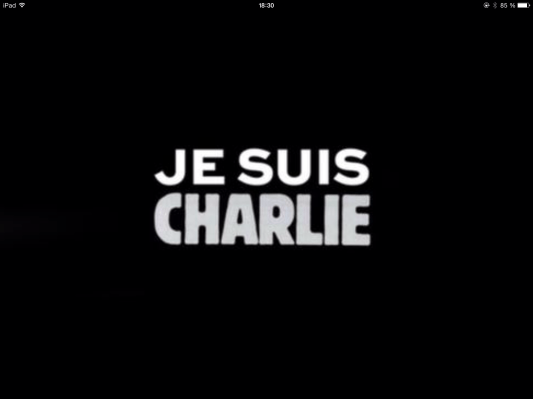Here at TechCrunch we primarily write about gadgets and gizmos and the folks who build and fund them.
It’s a job we love… an amazing job… where we get to be among the first witnesses to the tools of tomorrow, while telling the stories of the magicians who make them.
As a writer, I’m incredibly grateful for the privilege.. And every once in a while I’m reminded what a great privilege it is.
Today, when 10 journalists from Charlie Hebdo and two policeman have been senselessly murdered for doing a job they clearly loved too, is one of those days.
As journalists, we all play with language and symbols, and try our best to be thought provoking (and occasionally just provoking). Our gift is that we can do it mostly free from fear.
The backstory on why Charlie Hebdo was targeted almost doesn’t matter. We take for granted in the West that people should be allowed to say what they please, when they please, and as they please. It’s moments like this (and even what happened with ‘The Interview’) that remind us how precious and fragile this freedom, freedom of speech, is.
It’s true, words can be dangerous. And images can be dangerous. But it’s important that we be allowed to say them, and show them.
The people who make us read and see things we would rather not force us to confront those things that we fear, or don’t understand, as a way to get to a place where we can begin to understand them.
In the wake of the shootings, the editor of Germany’s most popular satirical magazine, The Titanic, said “Satire is a human right.” And it is.
Critical satire is a way for people to challenge perceived wisdom and established thinking… And, as my colleague John Biggs likes to say, it has the power “to afflict the comfortable and comfort the afflicted.”
Challenging convention is woven into the fabric of what it means to be entrepreneurs, investors, inventors, and thinkers. None of the aforementioned gadgets and gizmos on display at CES would be possible without the thought of “Why not?” that someone had in their head.
I don’t want to stray too far from the point… which is simply that I (we) wanted to add our voice to the chorus that’s denouncing the senseless murders of talented people. But it is worth noting that in their own way, those satirists were trying to challenge conventions. And perhaps inspire a new generation of thinkers and entrepreneurs, of writers and cartoonists, of investors and inventors.
This wasn’t intended to be part of our regularly scheduled programming, but it seemed impossible not to write something. As Alexia wrote to me over Skype, when I asked if we should address today’s tragedy, “People are getting killed for what we do and we’re just talking about gadgets.”
If we need a tech angle for this, and can’t just voice our outrage, our horror, and our overwhelming sadness that twelve people are now dead, killed for nothing more than doing what they loved, here’s one: #jesuischarlie and #charliehebdo are both trending on Twitter right now. As they should be.
I had never heard of Charlie Hebdo before, now I’ll never forget it.
